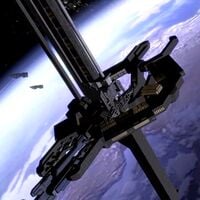Magnetic Accelerator Cannon: Difference between revisions
From Halopedia, the Halo wiki
No edit summary |
No edit summary |
||
| Line 2: | Line 2: | ||
==Summary== | ==Summary== | ||
The Magnetic Accelerator Cannon or MAC gun is the standard main weapon of all [[UNSC]] cruisers, destroyers and frigates | The Magnetic Accelerator Cannon or MAC gun is the standard main weapon of all [[UNSC]] cruisers, destroyers and frigates | ||
The MAC is a linear acceleration system, comprised of several superconducting coils. When fully charged, the system can accelerate a massive ferric-tungsten (or depleted uranium) projectile to a considerable fraction of the speed of light. The damage inflicted is tremendous, but a major drawback is that the MAC guns requires massive amounts of energy. The accelerating coils are powered by capacitors, which requires a significant time to recharge after firing. This technology is much like the magnetic coils the Covenant use to control plasma | The MAC is a linear acceleration system, comprised of several superconducting coils. When fully charged, the system can accelerate a massive ferric-tungsten (or depleted uranium) projectile to a considerable fraction of the speed of light. The damage inflicted is tremendous, but a major drawback is that the MAC guns requires massive amounts of energy. The accelerating coils are powered by capacitors, which requires a significant time to recharge after firing. This technology is much like the magnetic coils the Covenant use to control plasma | ||
Revision as of 20:43, July 27, 2006
Summary
The Magnetic Accelerator Cannon or MAC gun is the standard main weapon of all UNSC cruisers, destroyers and frigates
The MAC is a linear acceleration system, comprised of several superconducting coils. When fully charged, the system can accelerate a massive ferric-tungsten (or depleted uranium) projectile to a considerable fraction of the speed of light. The damage inflicted is tremendous, but a major drawback is that the MAC guns requires massive amounts of energy. The accelerating coils are powered by capacitors, which requires a significant time to recharge after firing. This technology is much like the magnetic coils the Covenant use to control plasma
This drawback has proven to be significant in combat against Coventant warships, since it has been shown that it requires several ship-scale MAC rounds to penetrate Covenant shields. An experimental version of the MAC gun has been developed, however, that is able to fire three successive rounds on one charge. A prototype of this weapon was mounted on the UNSC Pillar of Autumn.
MAC guns exist on many different scales, ranging from the Gauss-gun mounted on the Gauss Warthog, to the Mark V "Super" MAC guns. One Projectile from a "Super" MAC gun will literally shatter a Covenant ship.
Super MAC guns are loaded on defense platforms orbiting Reach, Earth, and other strategic locations that must be protected, and are much more powerful than normal MACs. The Orbital MAC guns (nicknamed "Super MAC" or "The Big Stick") can reload in five seconds. These weapons are able to destroy a Covenant warship with a single shot, and are commonly placed in geosynchronous orbit around a planet appearently over the location they are named after.
The one weakness of the orbital MAC guns is that the power stations that power them are located on the surface of the protected planet, and are thus susceptible to attack from Covenant ground forces. The pious nature of Covenant engagements have also presented a problem, since the Covenant are more than willing to sacrifice a number of ships in order to destroy one platform. This tactic was used during The Battle for Reach.
The MAC cannons can be found throughout the Halo universe, and play critical roles in many battles. The use of the MAC gun proved decisive when the Covenant fleet descended to Earth at the beginning of Halo 2, and was used as early on as Master Chief's first encounter with the Covenant, in which it was used to blow a hole into the ship through which Spartans could access.
A smaller version of this technology has been seen on the Gauss Warthog variant's Gauss turret, but on a smaller scale.
